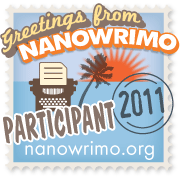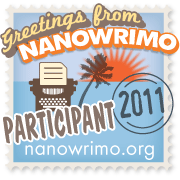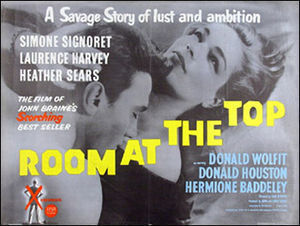Stuart Aken's Blog, page 283
November 3, 2011
Stuart's Daily Word Spot: Caboodle
[image error] Caboodle: noun - slang from US – usually in theform of 'the whole kit and caboodle'; the whole set or lot, everything,everyone.
'When the sled overturnedand plunged headlong into the crevasse, everything went with it and we lost thewhole kit and caboodle.'
Pic: On the road to Goodmanham, East Yorkshire.
Published on November 03, 2011 11:00
November 2, 2011
#NaNoWriMo Progress, Day 2 = 6556 words so far
[image error]
Funny day. I should have been in the office for the morning; it's my half day on Wednesday. But I awoke and, when I got out of bed, almost fell over. I showered and breakfasted as usual but every time I stood up I felt as though I was going to fall over and I had to use the walls to support me as I walked about the house. Even when I was sitting, I felt weirdly dizzy and disorientated. I clearly wasn't safe enough to drive to work and I couldn't walk to and from the bus stop, so I called work and went back to bed. By mid morning I was starting to feel just a little less odd and by midday I was starting to feel a bit more normal. But a short walk to town quickly showed me I was anything but back to normal again.
I managed a writing session late afternoon and did a little over 2,000 words. After the evening meal, I had another go and I've managed to complete 3620 words in total today, so still well on target, with a total of 6556 words, and chapter 3 just started. Let's hope tomorrow greets me with a bit more normality.
[image error]
I managed a writing session late afternoon and did a little over 2,000 words. After the evening meal, I had another go and I've managed to complete 3620 words in total today, so still well on target, with a total of 6556 words, and chapter 3 just started. Let's hope tomorrow greets me with a bit more normality.
[image error]
Published on November 02, 2011 20:37
Stuart's Daily Word Spot: Backchat
 Image via Wikipedia
Image via WikipediaBackchat: noun – colloquial - impertinent orimpudent repartee, especially to a superior.
'You'll feel the sting ofthe birch on your tender flesh if I hear any more backchat from you, missy!'

Published on November 02, 2011 12:00
November 1, 2011
NaNoWriMo Progress, Day 1 - 2936 Words
 Well, I made a start. Up relatively early and did 3/4 hour before driving to the office to earn a crust. Back home in time for a tea prepared by my wonderful wife. A short rest and then back to the keyboard. In total, I've produced 2936 words today, completing chapter 1 and making a very short start to chapter 2.
Well, I made a start. Up relatively early and did 3/4 hour before driving to the office to earn a crust. Back home in time for a tea prepared by my wonderful wife. A short rest and then back to the keyboard. In total, I've produced 2936 words today, completing chapter 1 and making a very short start to chapter 2.Enjoying the process; having fun with the creative flow of words. Let's hope it lasts.
I'm hoping the people at NaNoWriMo will soon have the widget ready to allow me to keep track of my word count on my blog. It's not yet available, but as soon as it is, I'll plug it in and keep a running total for those who are interested.

Published on November 01, 2011 20:42
Stuart's Daily Word Spot: Abed
 Abed: adverb - in bed; laid up.
Abed: adverb - in bed; laid up.Simple, if a littleold-fashioned, this is a word more often used in poetry today than in prose.
'Sarah, abed still afterthe previous day's hard trek, lay listening to the soft sound of rain on theshack's tin roof.'
Pic: The village of Goodmanham, East Yorkshire.
[image error]
Published on November 01, 2011 11:30
October 31, 2011
Taking The NaNoWriMo Challenge
 NaNoWriMo is short for 'National Novel Writing Month', an annual event that started in the USA and has become international.
NaNoWriMo is short for 'National Novel Writing Month', an annual event that started in the USA and has become international.Okay, so I'm mad. Nuts,perhaps, but a touch of insanity never did anyone any real harm. The challenge,for those who don't know it, is to write at least the first 50,000 words of anovel during the month of November. This requires an average daily word countof 1,667. It's generally considered good going to produce between 500 and 1,000words per day; James Joyce once famously admitted to having written only 1 wordon one day whilst writing, I think, Ulysses, and Hilare Belloc took 13 years towrite one of his novels. On the other hand, Antony Trollope was pretty speedy,and he's not alone.I've been known to write acomplete short story of up to 4,000 words in a day and, whilst writing myfantasy trilogy (still a work in progress, by the way), I've managed between 2and 3,000 words a day fairly frequently. I start this challengetomorrow. A Tuesday. Tuesday is my long day at work (I'm employed part time,doing 18.5 hours over 3 days), the rest of the time, my writing is my work. I'vecreated my characters and have a basic framework upon which to hang events. Iknow roughly where I intend to go with the story and I have a theme and a styleI wish to use. With this book, I want mostly to entertain and amuse; so I'maiming primarily for comedy. Having previously written only short spells offunny stuff, I've no idea how I'll perform on a longer work. But, hell, that'sthe whole point of this: to set yourself a challenge.It's a self challenge.You're not in competition with other writers in this forum. The idea is foreach individual writer (and it's estimated there'll be over 250,000 of us!) toset out to do the very best they can in the time allocated.So, I invite you all tojoin me as I make this journey. If you're a wannabee novelist who has never hadthe courage, determination, will or opportunity to begin that opus you'vecarried in your head, I suggest you use this as the stepping stone tocompletion of your dream. The link for the supporting site is http://www.nanowrimo.org/en/dashboard and it's a five minute job to register. Youhave until midnight tonight to join in the fun.If you're a reader with nopretentions toward writing, then I invite you to follow my progress and ask foryour support in the form of comments as I feed you the daily progress. I'm making a publicdeclaration of this aim, and I stand to make a fool of myself if I don't manageat least the 50,000 words, but I'm taking the risk in the hope that somethinggood and useful will come out of the effort.Wish me luck. I'm going toneed it!

Published on October 31, 2011 19:07
Stuart's Daily Word Spot: Ambiguity or uncertainty?
 Image via Wikipedia
Image via WikipediaAmbiguity or uncertainty?Ambiguity: noun - hesitation, doubt or uncertainty aboutyour course; something that can be understood in more than one way; anuncertainty; double meaning; an expression having more than one meaning.
Uncertainty: noun - being uncertain; doubtfulness,hesitation or irresolution; a point of doubt; something of which the outcome isuncertain;
As you can see, these twowords are interchangeable in many cases. However, I'm concerned here with theirapplication to writing. An author can use ambiguity to express a dilemmaexperienced by a character. He can describe events, emotions and actions interms that leave the reader feeling uncertain. And both of these techniques arevalid. What a good writer will avoid, however, is the use of ambiguity toexcuse his own uncertainty about elements of his story or characterisation.Such ambiguity is quickly seen for the uncertainty it is in reality and areader thus alerted will then have difficulty in continuing to trust thehonesty of the writer. Once you've lost a reader's trust, you've almostcertainly lost a reader.So, if you're portrayingambiguity, make sure your own lack of resolution is not the cause and that youdisplay doubt in a way that makes it clear who or what is uncertain. Ambiguityis a subtle quality in writing and needs careful handling if it is to beunderstood for what it is.
'Martha's eyes grew softand wide every time she saw Harry, but her hands clenched into tight fists ashe approached.' Martha's feelings forHarry are ambiguous, but it is clear the writer intended this and there is nosign of uncertainty from the author.
'Brian was determined ashe drew the gun from the holster; this was the chance he'd dreamed of for solong. He pointed it through the gap in the fence, but, suddenly, he wonderedwhether he should actually kill his rival.' This displays moreuncertainty on the part of the writer than the potential killer. In particular,that give-away 'suddenly' suggests the author rather than the character isuncertain about what should happen. The first sentence makes it clear thecharacter is set on doing the deed and it is only in the second sentence thatthe writer has had some doubts about whether he should allow his character tokill at this time.
'Brian drew the gun fromits holster without hesitation and aimed it through the gap in the fence. Ashis intended victim wandered into view, and turned her face to him, hediscovered his hand was shaking.'Here it is the characterwho is uncertain and the writer has employed ambiguity to give more depth tothe story.
[image error]
Published on October 31, 2011 12:00
October 30, 2011
Stuart's Daily Word Spot: Zealous
 Zealous: adjective - full of zeal; activelypromoting a person or cause; marked by zeal.
Zealous: adjective - full of zeal; activelypromoting a person or cause; marked by zeal. 'Jason's zealous defenceof his sect's dogma had always been a bone of contention with his girlfriend,who believed in tolerance in all matters spiritual.'
'Your devotion and zealousguardianship of my daughter has not escaped my attention, Boris, and you willbe well rewarded when the time comes.'
Pic: A vintage car travels the road just outside Huggate, East Yorkshire.

Published on October 30, 2011 14:00
October 29, 2011
Stuart's Daily Word Spot: Need or want?
 Image via Wikipedia
Image via WikipediaNeed or want?Need: noun - necessity for a person or thing; a condition or time ofdifficulty, distress, or trouble, lacking or requiring some necessary thing;exigency, emergency, crisis; destitution, lack of the means of subsistence orof necessaries, poverty; requiring or being motivated to do, a necessity to do;something requiring action; a particular point or respect in which some necessityor want is present or is felt; a piece of necessary business; something wanted,a requirement.
Want: noun - lacking something desirable or necessary; deficiency orshortage; lacking the necessities of life; penury; poverty, famine, starvation;hardship or suffering; a condition marked by the lack of some necessity; need; somethingneeded or desired; a requirement, a request; a defect, fault or shortcoming.
When I decided to comparethese two words, in common with many older folk, I assumed their dictionarydefinitions would support my preconceptions. However, the good old SOED haseducated me once again. On the face of it, the two words can be interchanged moreor less unconditionally.BUT, when it comes to thatoft heard phrase, 'I need…' usually uttered by an offspring, there is adistinction that should be made, I think.
Children of all ages, andI include those adults who refuse to mature, often state that they need somethingwhen they simply desire it. Usage suggests that, in most cases, they 'want'what they call a 'need'. I think I can best express this by explaining that inthis particular case, 'want' indicates desire and 'need' indicates necessity.So:'I need a new dress,skirt, etc.' should properly be expressed as 'I want a new…' since the item inquestion is not a necessity but something desired.
'I need a text book, setof pens, breakfast, etc.' is fine, as these are necessities for either life orschooling.
The dividing line is fineand, probably, subjective, but I think all parents will know where it should bedrawn.
[image error]
Published on October 29, 2011 04:00
October 28, 2011
Stuart's Daily Word Spot: Yap
 Image via Wikipedia
Image via WikipediaYap: verb - bark sharply, fussily, shrilly; yelp; speak snappishly,complainingly; talk loudly, foolishly, loquaciously; chatter.
'That woman goes out allday to work and leaves her dog alone, so it yaps for hours, awaiting herreturn.'
'Yap, yap, yap; do youever stop complaining?'
28 October 1986 JohnBraine, author, died. Remember 'Room at the Top'?

Published on October 28, 2011 03:00



